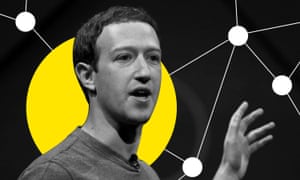
Cambridge Analytica and Facebook accused of misleading MPs over data breach
Call for Facebook boss Mark Zuckerberg to testify before parliamentary committee
The head of the parliamentary committee investigating fake news has accused Cambridge Analytica and Facebook of misleading MPs in testimony, after the Observer revealed details of a vast data breach affecting tens of millions of people.
After a whistleblower detailed the harvesting of more than 50 million Facebook profiles for Cambridge Analytica, Damian Collins, the chair of the House of Commons culture, media and sport select committee, said he would be calling on the Facebook boss, Mark Zuckerberg, to testify before the committee.
He said the company appeared to have previously sent executives able to avoid difficult questions who had “claimed not to know the answers”.
Collins also said he would be recalling the Cambridge Analytica CEO, Alexander Nix, to give further testimony. “Nix denied to the committee last month that his company had received any data from [his firm] GSR,” he said. “We will be contacting Alexander Nix next week asking him to explain his comments.”
The whistleblower Chris Wylie’s claim that the 50m, mostly American, profiles were harvested in one of Facebook’s biggest data breaches caused outrage on both sides of the Atlantic, with lawmakers in both the UK and America, and a state attorney general calling for greater accountability and regulation.
Wylie said the personal information was used to build a system to influence voters.
“We need to hear from people who can speak about Facebook from a position of authority that requires them to know the truth,” Collins said. “Someone has to take responsibility for this. It’s time for Mark Zuckerberg to stop hiding behind his Facebook page.”
Shortly before the story broke, Facebook’s external lawyers warned the Observer that it was making “false and defamatory” allegations and reserved Facebook’s legal position. Facebook denies the harvesting of tens of millions of profiles by Cambridge Analytica, working with Cambridge academic Aleksandr Kogan and his firm GSR, was a data breach.
The tech giant also suspended the whistleblower Chris Wylie from the platform “pending further information” over misuse of data, along with his former employer Cambridge Analytica and its affiliates, and the academic they worked with, Aleksandr Kogan.
The public attack on Wylie came after he had approached the tech giant about the data breach, offering to help investigate. He described it as a chilling attack on someone acting in the public interest.
“They acknowledged my offer but then turned around and shot the messenger. I’m trying to make amends for my mistakes and so should Facebook,” he told the Guardian.
“Facebook has known about this for at least two years and did almost nothing to fix it. This is not new. And it’s only by coming forward that Facebook is now taking action. People need to know this kind of profiling is happening.”
Last month, both Facebook and Cambridge Analytica CEO Alexander Nix told the parliamentary inquiry into fake news that the company did not have or use private Facebook data, or any data from Kogan’s firm, Global Science Research (GSR).
But in its statement on Friday night, explaining why it had suspended Cambridge Analytica and Wylie, Facebook said it had known in 2015 that profiles were passed to Nix’s company.
“In 2015, we learned that a psychology professor at the University of Cambridge named Dr Aleksandr Kogan lied to us and violated our platform policies by passing data from an app that was using Facebook Login to SCL/Cambridge Analytica,” the statement said.
Collins attacked Facebook for appearing to have been “deliberately avoiding answering straight questions” in testimony to the committee.
“It is now clear that data has been taken from Facebook users without their consent, and was then processed by a third party and used to support their campaigns,” Collins said. “Facebook knew about this, and the involvement of Cambridge Analytica with it.”
Cambridge Analytica responded to the Observer story on Twitter before Collins had said Nix would be recalled. “We refute(s) these mischaracterizations and false allegations,” it said.
“Reality Check: Cambridge Analytica uses client and commercially and publicly available data; we don’t use or hold any Facebook data,” the company said. “When we learned GSR sold us Facebook data that it shouldn’t have done, we deleted it all – system wide audit to verify.”

Geen opmerkingen:
Een reactie posten
Opmerking: Alleen leden van deze blog kunnen een reactie posten.